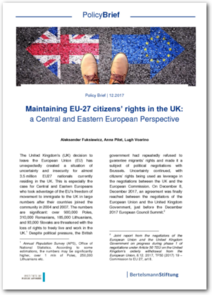On December 8, 2017, an agreement on EU27 freedom of movement rights for non-UK citizens living in the UK and UK citizens living in the EU was finally reached between the negotiators of the European Union and the United Kingdom Government, just before the December 2017 European Council Summit. Our policy paper analyses the situation with particular regard to the CEE perspective.
The United Kingdom’s (UK) decision to leave the European Union (EU) had unexpectedly created a situation of uncertainty and insecurity for almost 3.5 million EU27 nationals currently residing in the UK. This is especially the case for Central and Eastern Europeans who took advantage of the EU’s freedom of movement to immigrate to the UK in large numbers after their countries joined the community in 2004 and 2007. The numbers are significant: over 900,000 Poles, 310,000 Romanians, 185,000 Lithuanians, and 93,000 Slovaks were threatened with the loss of rights to freely live and work in the UK. Despite political pressure, the British government had repeatedly refused to unilaterally guarantee migrants’ rights and made it a subject of political negotiations with Brussels. Uncertainty continued, with citizens’ rights being used as leverage in the negotiations between the UK and the European Commission. On December 8, 2017, an agreement was finally reached between the negotiators of the European Union and the United Kingdom Government, just before the December 2017 European Council Summit.
Our policy paper, prepared in cooperation with the Warsaw-based think tank Institute of Public Affairs, provides a general overview of the Central and Eastern European regional perspective on the ongoing Brexit negotiations. It focuses on the free movement of people and the rights of EU27 citizens living in the UK. It argues that those EU27 nationals acquired (or will acquire) their rights on the basis of the EU’s freedom of movement (without time limit), and, therefore, their rights should be maintained despite the UK’s withdrawal from the Union. To enrich the ongoing debates with facts and opinions from the region, this paper seeks to sum up the arguments and the state of play in order to better highlight the outlook of CEE on the matter.




